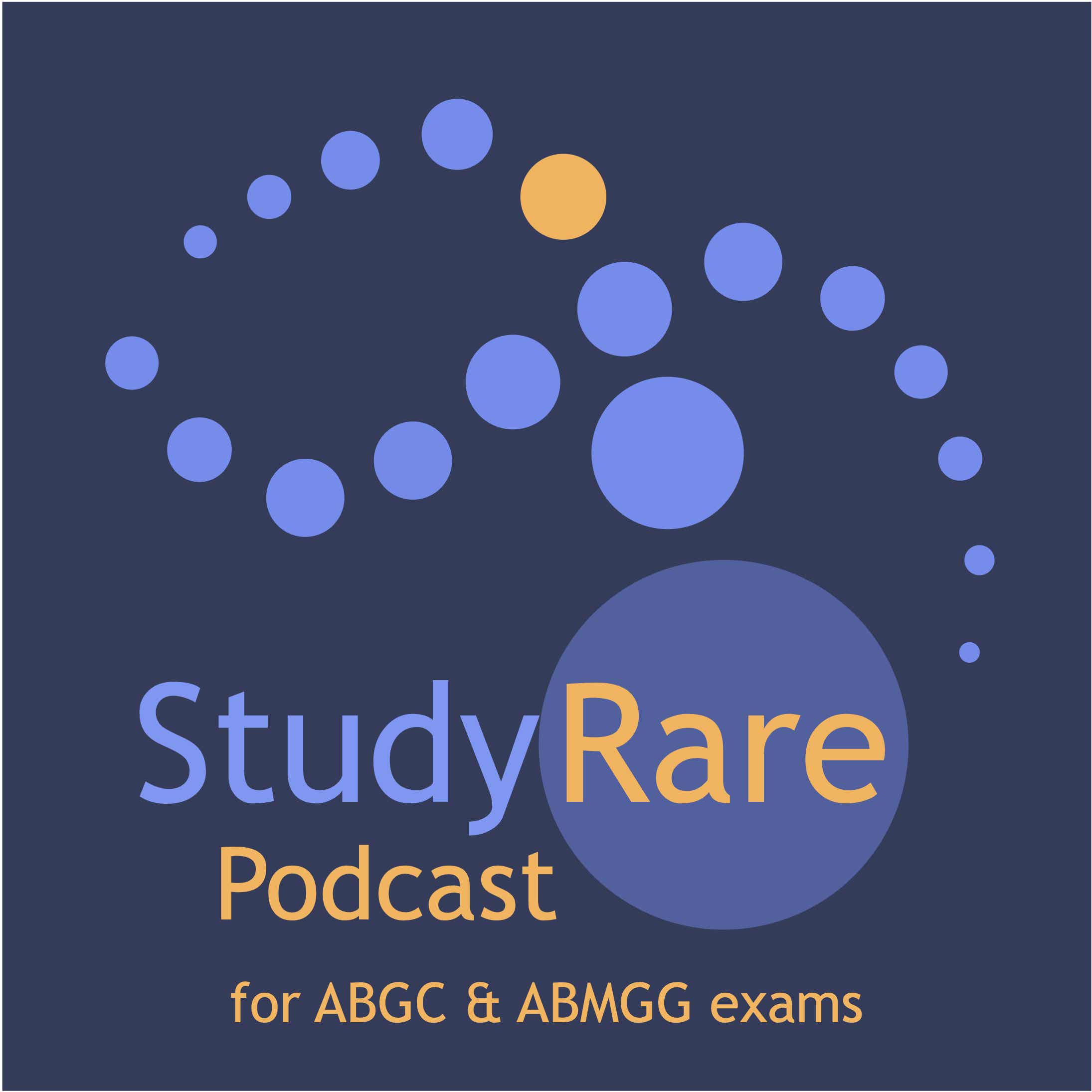StudyRare Podcast

StudyRare Podcast
Podcast Description
A podcast with board-style questions for genetic counseling students and genetics fellows who are preparing for the ABGC or ABMGG board exam. This is a companion podcast to the StudyRare newsletter: studyrare.substack.com studyrare.substack.com
Podcast Insights
Content Themes
The podcast covers a range of topics pertinent to genetics and genetic counseling, such as career pathways in medical genetics, genetic testing advancements, and specific cases involving rare disorders like Barth syndrome. Episodes spotlight sessions from significant events, like the ACMG Annual Meeting, with discussions on practical skills like publishing and variant interpretation, as well as emerging therapeutic approaches.

A podcast with board-style questions for genetic counseling students and genetics fellows who are preparing for the ABGC or ABMGG board exam. This is a companion podcast to the StudyRare newsletter: studyrare.substack.com
Hello,
Today is Day 4 of the American College of Medical Genetics (ACMG) Annual Meeting in Los Angeles. In this podcast, I discuss a few sessions for today (Fri, March 21) that may be of interest to trainees.
* The first session is “How to Get Your Content Published” (10:30 AM). This session is led by a representative from Elsevier, a large publisher. While publishing is an important way to get credit for your academic work, the process can be time-consuming and frustrating. Reasons for this include navigating complex submission systems, coordinating with busy co-authors, and balancing writing with other responsibilities. Hopefully, this session will offer some insight into making the publication process more efficient.
* At 1:30 PM, there is a session titled “2025 Student Workshop: Pathways to Careers within Medical Genetics and Genomics.” This session is aimed at students and early-career professionals exploring career options in genetics. Speakers include Dr. Miriam Blitzer, the immediate past CEO of ABMGG, as well as representatives from clinical genetics, laboratory genetics, and genetic counseling. This seems like a great opportunity for undifferentiated students to connect with experts across a variety of career paths in genetics.
* Also at 1:30 PM, there is a session titled “N-of-1 ASO Therapies: The How-Tos of Implementation.” ASO stands for “Antisense Oligonucleotides,” which are short strands of nucleotides that degrade specific mRNA transcripts or promote exon skipping. N-of-1 refers to a clinical trial that involves a single patient rather than a large study population. N-of-1 trials involving an ASO are appropriate for patients with a pathogenic variant causing an extremely rare and progressively fatal disorder with no other treatment options. But why ASOs specifically? ASOs target the molecular mechanism of disease, which offers the potential for a precise therapeutic intervention. The design and synthesis of ASOs is also more straightforward relative to other targeted genetic therapies. In addition, the FDA has guidance on using custom ASOs in N-of-1 settings, which provides a regulatory pathway for these therapies to help treat rare monogenic disorders.
* At 3:30 PM, there’s a session titled “Current Practice and Future Prospects for Autologous Ex Vivo Gene Treatment and HSCT in Lysosomal Storage Disease.” Ex vivo gene therapy involves removing the patient’s bone marrow cells, modifying them with a genetic therapy (in this case, with the intent to replace the missing enzyme), and then reinfusing the cells back into the patient. This approach is used for treating certain lysosomal storage disorders, as the patient’s own genetically-modified stem cells can now produce functional enzymes to correct the underlying metabolic defect. An example of this therapy is atidarsagene autotemcel (Lenmeldy), an FDA-approved therapy used to treat metachromatic leukodystrophy. For those interested in gene therapy and hematopoietic stem cell transplantation (HSCT), this session will be valuable.
* Finally, at 5:30 PM, there are several concurrent “Diagnostic Challenge” sessions. These sessions are split into different categories: pediatric & prenatal, laboratory genetics, and adult & cancer genetics. Each session features a panel of experts who will discuss particularly challenging or unsolved cases. These sessions will offer an opportunity to hear how experts approach and think through complex diagnoses.
Please feel free to share your thoughts, and see you in the next episode!
Daniel
This is a public episode. If you would like to discuss this with other subscribers or get access to bonus episodes, visit studyrare.substack.com

Disclaimer
This podcast’s information is provided for general reference and was obtained from publicly accessible sources. The Podcast Collaborative neither produces nor verifies the content, accuracy, or suitability of this podcast. Views and opinions belong solely to the podcast creators and guests.
For a complete disclaimer, please see our Full Disclaimer on the archive page. The Podcast Collaborative bears no responsibility for the podcast’s themes, language, or overall content. Listener discretion is advised. Read our Terms of Use and Privacy Policy for more details.